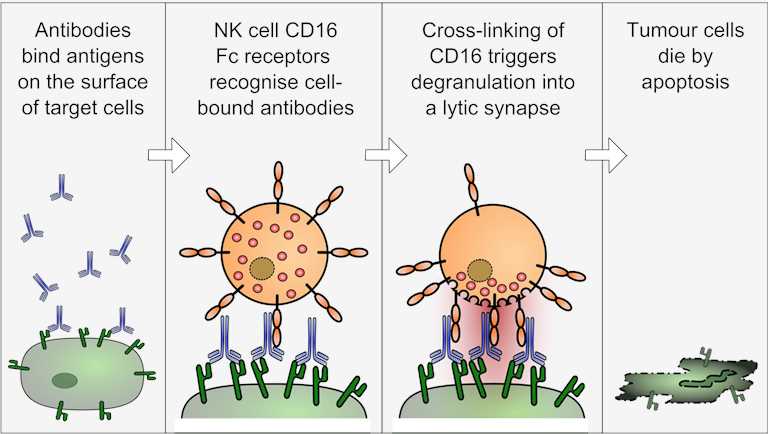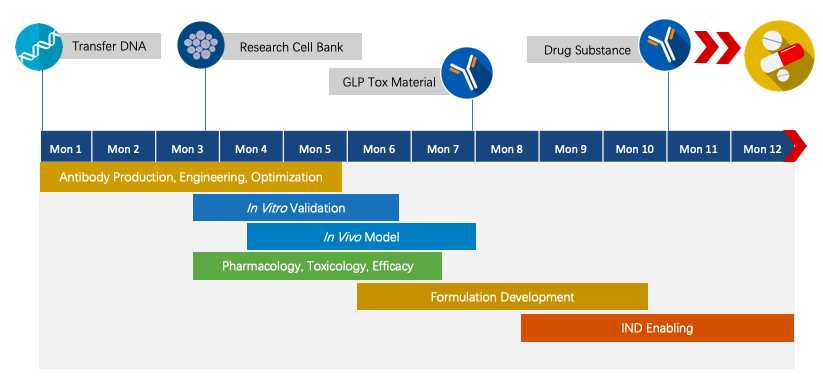Next-IO™ Anti-CD16 (FcgRIIIA) IgG Program
With our advanced therapeutic antibody discovery and development platforms, Creative Biolabs is able to come up with various collaboration-based programs to develop novel candidate biologics with greater therapeutic potentials. We are committed to achieving strategic collaborations with our partners. By building a collaborative, consulting and support relationship, we are hoping to advance cancer immunotherapy together.
Augmenting NK Cell Activation Pathways
For the past couple years, significant clinical achievements are made in the cancer immunotherapy., especially for anti-immune checkpoint antibody therapy and CAR-T therapy. As an important immune cell type, natural killer (NK) cell shows critical anti-cancer killing activities. Based on the fact that NK cells have diverse functions and pathways in the immune system, a promising therapeutic approach is developed to facilitate NK cell activation via triggering antibody-dependent cell-mediated cytotoxicity (ADCC) activities or targeting co-stimulatory receptors. This program aims to develop the therapeutic monoclonal IgG antibody against CD16/FcgRIIIA with a hope to enhance ADCC functions in cancer treatments.
Mechanism of Action
CD16, also known as Fcγ receptor IIIa (FcγRIIIa), is expressed in NK cells and various human blood monocytes. CD16 transduces the signals by reacting with the Immunoreceptor Tyrosine-based Activation Motif (ITAM)-bearing adaptors, CD3ζ, and Fc receptor common γ (FcRγ) chain the in NK cells. From research, cD16 binds to the Fc region of immunoglobulin G (IgG) and a very important reaction for ADCC activity and the final clinical outcome. CD16 genotypes, in this case, contributes the most. Once the CD16 recognizes the Fc region of the antibody on the surface of target cells, it will trigger NK cell cytotoxicity and tumor apoptosis. CD16 is one of the most potent targets expressed by NK cells that has potent anti-cancer, ADCC, and cytokine production functions.
 Fig.1 Antibody-dependent cell-mediated cytotoxicity. (from Wikipedia)
Fig.1 Antibody-dependent cell-mediated cytotoxicity. (from Wikipedia)
Our Anti-CD16 (FcgRIIIA) IgG Program
Therapeutic monoclonal antibodies induce anti-cancer responses through various mechanisms, such as immune checkpoint inhibition, co-stimulatory enhancement, etc. For some mAbs, they exhibit stronger anti-cancer responses by the assistance of ADCC. Here, our program aims to optimize this synergy by exploring mAbs with CD16 engagement through Fc optimization. With years of antibody engineering experiences and advanced platforms, our scientists are committed to developing mAbs with desired characteristics.
Program Planning and Management
We have extensive experience in performing comprehensive program developments and effective problem-solving. For our Next-IOTM programs, we are committed to delivering the finalized program to our partners within about 1.5 years. The accurate timeline will be determined on a case-by-case basis. Here is a draft timeline for your glance.
 Fig.2 The timeline of Next-IOᵀᴹ programs.
Fig.2 The timeline of Next-IOᵀᴹ programs.
Collaboration
With our advanced antibody discovery and engineering strategies, Creative Biolabs is dedicated to developing the mAb with better CD16 engagement. We are looking forward to any collaboration opportunity with potential partners to co-develop the anti-CD16 IgG program. You will have our promise to tackle any challenge and risk together. If you are interested in this program or any other Next-IOTM programs, please feel free to contact us to learn more on the collaboration opportunity!
For Research Use Only | Not For Clinical Use


 Fig.1 Antibody-dependent cell-mediated cytotoxicity. (from Wikipedia)
Fig.1 Antibody-dependent cell-mediated cytotoxicity. (from Wikipedia)
 Fig.2 The timeline of Next-IOᵀᴹ programs.
Fig.2 The timeline of Next-IOᵀᴹ programs.
 Download our brochure
Download our brochure